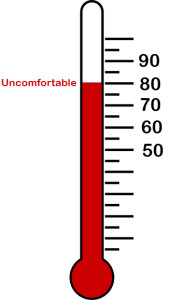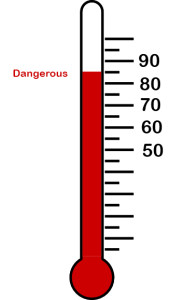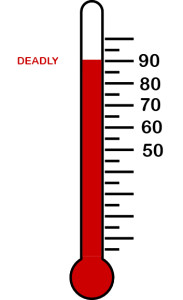Ferrets cannot sweat, so a fan is NOT going to help unless the ferret is wet.
.
.
.
.
.
Erika Matulich, PhD says:
Temperatures above 80 degrees Fahrenheit are uncomfortable for ferrets, temperatures above 85 can cause medical problems within hours, and temperatures above 90 can be fatal. Although ferrets can live through high temperatures, heat-related stress weakens their immune system and shortens their life. If the outdoor climate has temperatures above 80 degrees, ferrets should be kept indoors in a temperature-controlled environment.
These temperature guidelines assume low humidity levels (less than 40 percent). If you live in a humid climate, look at the heat index (a combination of temperature and relative humidity) rather than the actual temperature. If the thermometer reads 82 degrees F and the relative humidity is 80 percent, the heat index is 90, meaning that it feels to us like 90 degrees F. This is because higher humidity levels don’t allow for moisture evaporation and heat dissipation from the skin. Although ferrets can’t sweat, they still need to lose heat from their footpads, nose, ears, and mouth; high humidity doesn’t allow for this. Because my ferrets and I live in South Florida, I pay special attention to humidity so that my fuzzies don’t have problems.
To avoid heat stress, keep your ferret in an air-conditioned room, away from direct sunlight. Provide adequate water, and use ice or evaporative cooling to cool the surrounding air. Despite taking these precautions, you may have a ferret suffer from heat stress, which can quickly lead to heatstroke. Heatstroke can be fatal within minutes—one of the reasons you should never leave your ferret (or any pet or animal) in a parked car.
See entire article: Heatstroke in Ferrets





